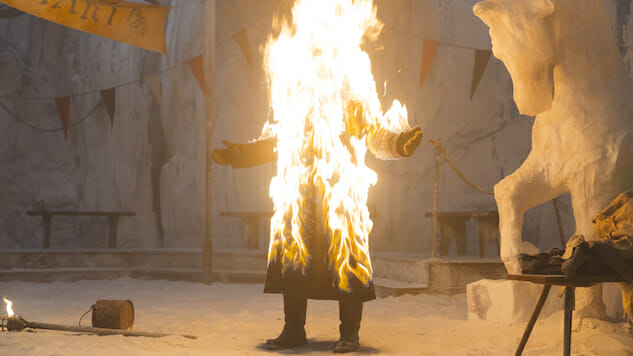How The Terror, Like Reality TV, Dissects Toxic Masculinity
Photo: Aidan Monaghan/AMC
Stranded in the middle of nowhere, with your initial, idealized goal long forgotten, you look around at the strange men whose company you’re forced to endure while increasing amounts of your remaining sanity slip through your fingers and wonder, “How did it come to this?” You’re either a sideburned sailor aboard The Terror, searching for the Northwest Passage during the mid-1800s, or you’re a contestant on Bachelorette in 2017. Turns out, shoving a bunch of men together under emotionally-taxing circumstances hasn’t changed much. And when your common enemy is the situation, rather than a camaraderie-building wartime foe, it’s easy to begin turning on each other.
The Terror’s intense zoo of dudes has created some of the best, most detailed depictions of men butting heads on television. Men that entered the dangerous naval enterprise of finding a trading route between the Pacific and Atlantic Oceans through the Arctic waterways north of Canada with different degrees of dedication. Some, like Captain Sir John Franklin (Ciarán Hinds), are in it for God and country. Some, like Commander James Fitzjames (Tobias Menzies)—and most reality stars—are more egoistic. And some, like Cornelius Hickey (Adam Nagaitis, the show’s breakout star), are there just to watch the world burn from a more entertaining perspective.
Their captivity once their ship becomes encased in ice, and the extremes their plight asks them to suffer, create a torturous environment that magnifies masculine flaws. In isolated groups, men competing for the same prize (be it a successful voyage, a bride, or mere survival) devolve into factions, and thus conflict; the same pressurizing factors that exist naturally in The Terror (except for the mystical monster after them) are replicated in reality TV like The Bachelorette, A Shot at Love with Tila Tequila, or I Love New York, and in each case distill our baser instincts. The drama occurs when men break down social norms and revert to more primal, stereotypical masculinity—where they have to be headstrong, pseudo-independent alphas (e.g. Chad Johnson from The Bachelorette’s twelvth season)—even though survival and success demand the exact opposite behavior. That makes for juicy TV, whether in the form of real-life fireworks or fictional horror.
Either way, the setting shapes those within it, and their relationships to one another. What was once voluntary—nobody is conscripted to be an explorer or a reality TV star—becomes something so reprehensible to its participants that some remove themselves from the proceedings, prize be damned. That could be by walking off the set, never to return, or by self-immolation, burning down The Terror’s crew’s carnival at the same time. For example, MTV’s Are You the One? traps its contestants in a small “society” where the only form of entertainment is intoxication. Since they’re not allowed to bring books, computers, or phones to the home they share with the female contestants, there’s nothing to do but drink, screw, and pray for salvation. That’s no way to stay sane. After all, as we see with The Terror’s empathetic Dr. Goodsir (Paul Ready, so sweet they might as well have named his character Mr. Niceboy), those that find solace in either earnest knowledge about the goal (actually getting to know the Bachelorette; learning an indigenous language) or the Joker-like pursuit of chaos are the one who most successfully navigate the cruel game.
Even if someone takes a healthy path through their plight, though—call it The Shawshank Redemption approach—that path inevitably has a messy end. In reality TV, it’s in the form of these groomed, besuited dudes’ total breakdown: They become mockeries of themselves (OK, some started as mockeries of themselves) and get in each others’ faces. We all know those fights, filmed with shaky-cam on the outskirts of a party, where two adult men will get excruciatingly close to each other because they got beef.
That makes it all the more rare and reassuring when, even in the most dire of circumstances, some people fight the toxicity expected of them. In both The Terror and reality-competition shows, we get to watch evolutionary psychology at work, as men face hardsip with methods old and new. And it makes sense that these problems—even if the amount of mortal danger is certainly different a century and a half later—still affect people in much the same way: Animals don’t change that fast. It also makes sense that those who succeed, the survivors and rooting interests, are those who fight off the temptation to revert to their primal instincts. Cordiality and decorum in the face of hell isn’t a British stiff-upper-lip thing, it’s a stubborn refusal to play a perverse biological game of male-on-male competition. Even when the nature of the game demands “ask interesting questions” rather than “respect indigenous traditions so a spirit monster doesn’t tear you in half,” focusing on the steps to survive always gives you better odds.
The Terror airs Mondays at 9 p.m. on AMC.
Jacob Oller is a writer and film critic whose writing has appeared in The Guardian, Playboy, Roger Ebert, Film School Rejects, Chicagoist, Vague Visages, and other publications. He lives in Chicago, plays Dungeons and Dragons, and struggles not to kill his two cats daily. You can follow him on Twitter here: @jacoboller.







































